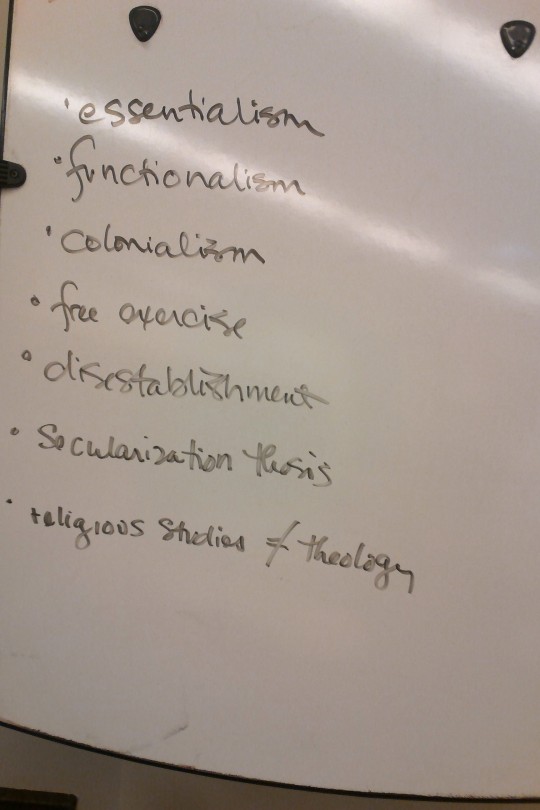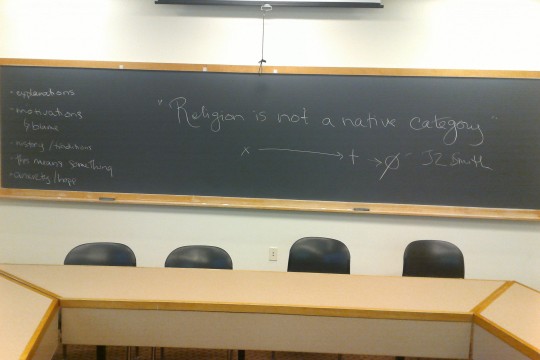Text
After Burwell
An unscheduled colleague visit/observation made me a bit more self-conscious about this session than I would have otherwise been, but the kids rocked it. They did a great job relating the analyses of the case back to the decision and dissent themselves, and were especially careful readers of the RFRA. (Which, as I’m several months behind in updating, I can now say they’ve completely muddled with the free exercise clause. Oh well.)
This was the first time I felt totally settled in my approach to this semester. It wasn’t a particularly flashy lesson plan, but the kids dug in and I think we really dug into the nuances of the case. V. satisfying.
Activity-wise: I just split them into two groups of two and had them discuss how the authors were reading the case, and whether the decision and dissent might agree or disagree with that reading.
Readings
Friedman, “My Business, Myself” (21 Jan 2013)
Miller, “Hobby Lobby Case Isn’t Really About Contraception” (24 March 2014)
Redden, “Hobby Lobby’s Hypocrisy” (1 April 2014)
Ingersoll, “Why Hobby Lobby Is a Pandora’s Box” (1 July 2014)
Sullivan, “The Impossibility of Religious Freedom” (8 July 2014)
Miller, “Obama Caves on (Another) Contraception Exemption” (25 August 2014)
Imhoff, “The Supreme Court’s Faith in Belief” (16 Dec 2014)
Keywords
RFRA & Citizens United
Compelling interest
Least restrictive means
Wheaton v. Burwell
0 notes
Photo

“Impossibility of Religious Freedom”
0 notes
Photo

Religious Freedom Restoration Act, by the numbers
0 notes
Quote
Today's decision elides entirely the sincerity of a challenger's religious belief and the substantiality of the burden placed on the challenger
Ruth Bader Ginsburg
0 notes
Photo


Boards from Burwell v. Hobby Lobby conversation
0 notes
Link
The Supreme Court determines that corporations have the right to religious freedom.
Jon Stewart on Hobby Lobby. Worked better than the John Oliver clip.
0 notes
Video
youtube
This is a little Channel One for undergrads, and it has a few inaccuracies. But still worthwhile as a rudimentary introduction.
0 notes
Text
Burwell v. Hobby Lobby
This was another session in which I thought 80 minutes would be more than enough, and we really could have split it into two classes. But I think for the broad strokes of the case, it was enough.
We started with some quick background on the makeup and function of the Supreme Court, which I followed with some specifics (that the court usually tries to make narrow decisions, currently skews conservative, has three women, two people of color, and--since 2010--no Protestants for the first time ever). Then we did some (comedic) background on the case.
We spent a lot of time discussing reading strategies for tackling a court case; I guess none of them had ever read a decision before. So I suggested they start with the Oyez report, and then look for evidence that supports the brief summary. I had them establish the facts of the case: we looked for questions, argument(s), and the reasoning that supported the decision. I also suggested that they spend some significant time with the dissent: first, because RBG is queen of the universe, and second, as I explained, a dissent author has to prove that she's understood the argument before disagreeing.
As the case was largely built on the precedent set by the Religious Freedom Restoration Act, we spent much of the discussion establishing the criteria for the Sherbert Test. And then we discussed Ginsburg's four point dissent to the decision. While one class definitely didn't feel like enough time to cover the case, the following class discussion pulled on this one in some really productive ways. I'm hoping the slower pace (which, frankly, still doesn't feel so slow) will continue to be this rewarding for the rest of the semester.
Readings
Burwell v. Hobby Lobby
Oyez report
Keywords
ACA
RFRA (Religious Freedom Restoration Act)
Employment v. Smith (1990)
Citizens United (2010)
Burwell v. Hobby Lobby (2014)
Sincerely held belief
Closely-held corporation
1 note
·
View note
Text
studying religion and sexuality
This class, as it turns out, was a bit ambitious -- it met right before the Puddle Jump. So of my three students, one skipped, one stared so longingly out the window that I finally let her out with a writing assignment, and one (a first year) insisted on staying anyway because she had struggled with the readings.
They wanted to talk about my piece first (fair, since it was definitely the easier of the two). Discussion questions: how do we define sex? How do we study sex in the context of religion? That went fairly smoothly, but they really struggled with the Fessenden and Cady piece.
We read the introduction to Religion, the Secular, and the Politics of Sexual Difference, which honestly I think I could design a class around. It took us longer to get through my first question (what assumptions do the authors say westerners make about secularism?) than I anticipated, but we got there eventually. The other two--how are the authors pushing back against these assumptions, and why do they feel their project is timely?--went more quickly, but were still a bit of a struggle. I'm not sure if the students were having a hard time with the reading itself (though I didn't think the language was particularly challenging) or just with paying attention while undergrads dressed like superheroes and carrying torches ran by the window on their way to jump in the pond.
Readings
Cady and Fessenden, “Gendering the Divide”
Goodwin, “Thinking Sex and American Religions”
Keywords
Secularization thesis
Oversignification
“moral narrative of modernity”
intersectionality
0 notes
Photo

blackboard for "studying sexuality"
0 notes
Quote
Sex is presumed guilty until proven innocent.
Gayle Rubin, "Thinking Sex"
0 notes
Text
studying sexuality
We did a quick review on what "religion" is and why people care about it. I reviewed the differences between sex, gender, and sexuality (love a recycled slideshow), and then we jumped into the readings.
We did some close reading with Rubin on the following questions:
why do we need a theory of sexuality?
why does Rubin call sex "a vector of oppression?"
what should a theory of sexuality do?
what axioms does Rubin propose?
And that led us into our activity for the day: drawing and modifying Rubin's charmed circle (stolen from History of American Sexuality, eons ago). I'll grab pictures of those later, but they did pretty well with it. There were a lot of points they wanted to push back on--sex in public, for some reason, was a real sticking point (until I asked if they expected to see people doing it on a regular walk in the park)--but these were mostly productive. We ended that section thinking about how Rubin problematizes essentialized definitions of sex, but presents a very essentialized view of religion.
The last half hour we looked at the Wolters piece, which I loved when I read over the break but am now concerned is a little too much inside baseball. Because it took so long to get through Rubin (that piece should really get two sessions just on its own, though that'll probably never happen), we really only scratched the surface on this piece: what queer theory does, and how Wolters critiques it. The piece did set up some conversation about the biases (western, racial, gendered, homonormative) of queer theory, though, so maybe that's enough to be starting with.
Readings
Rubin, “Thinking Sex: Notes for a Radical Theory of the Politics of Sexuality” (1984)
Wolters, “What the Fuck Is Queer Theory?” (2015)
Keywords
Charmed circle
Queer theory
Essentialism
Sex negativity
Fallacy of misplaced scale
Hierarchical valuation of sex acts
Social construction
0 notes
Quote
Religion is not a native category.
JZ Smith
0 notes
Photo


new semester, new boards
0 notes
Text
studying religion
As part of this semester's depth over breadth approach, I'm working through the theoretical framing of the class more slowly than I have in the past. So today was just "what we talk about when we talk about religion." I debated about which readings to use--I had originally planned to go the JZ Smith route--but ultimately settled on several pieces by Russell McCutcheon. They're not perfect, but they set up some good conversations, particularly about the imperialism implicit in defining religion, and we also got some good practice critiquing scholarly articles.
Side note: this is one of only three classes this semester where the assigned authors are only men. This is a good start, and also not enough progress.
Readings
McCutcheon, “Religion and Classification”
McCutcheon, “The Public Discourse on Religion”
Arnal and McCutcheon, “On the Persistence of Imagining Religion”
Key Terms
Essentialist
Functionalist
Colonialism
Disestablishment
Free exercise
Theology v. religious studies
Secularization thesis
0 notes
Video
youtube
sexuality v. religion
0 notes
